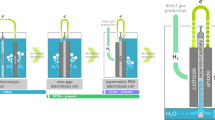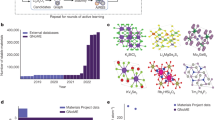Abstract
HIGGINS says several times that sulphuretted hydrogen is “a mere solution” or “suspension” of sulphur in hydrogen, and once that it contains nine particles of sulphur to five of hydrogen (pp. 78–81 of Higgins's book; the experimental results and the argument lead to the ratio nine particles of sulphur to five of hydrogen without any assumption about the weights of the atoms. The argument would occupy half a page of Nature). The idea and name of ‘equivalent’ were published by Cavendish in 1766 and 1788. I think Higgins deserves some credit for the Law of Multiple Proportions; but Berzelius said he did not state it and did not anticipate Dalton. Higgins's symbols did not anticipate Berzelius's; the letters do not always stand for elements and the same letter stands for different substances. Dalton put forward his theory in 1803 and gave a full account of it to Thomson in 1804, and what Davy said in 1809 seems irrelevant.
This is a preview of subscription content, access via your institution
Access options
Subscribe to this journal
Receive 51 print issues and online access
$199.00 per year
only $3.90 per issue
Buy this article
- Purchase on Springer Link
- Instant access to full article PDF
Prices may be subject to local taxes which are calculated during checkout
Similar content being viewed by others
Author information
Authors and Affiliations
Rights and permissions
About this article
Cite this article
PARTINGTON, J. William Higgins and John Dalton. Nature 167, 735–736 (1951). https://doi.org/10.1038/167735a0
Issue Date:
DOI: https://doi.org/10.1038/167735a0
Comments
By submitting a comment you agree to abide by our Terms and Community Guidelines. If you find something abusive or that does not comply with our terms or guidelines please flag it as inappropriate.



